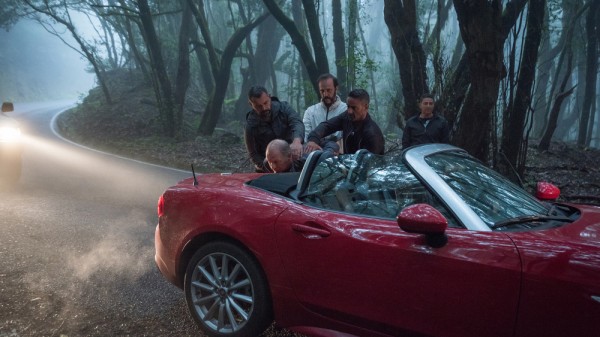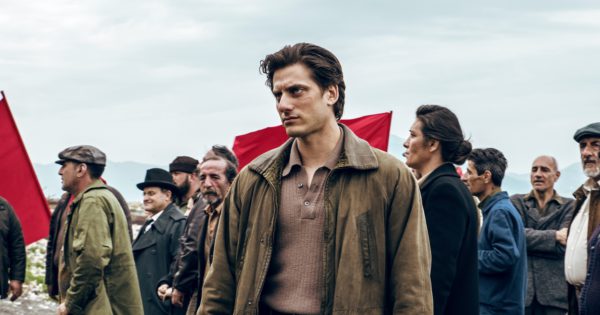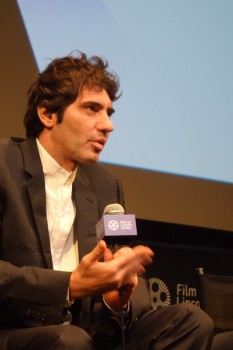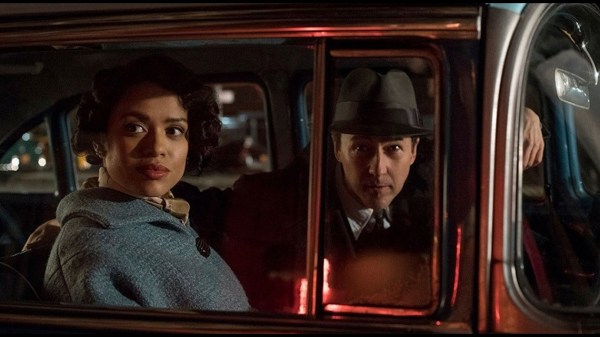-
BEANPOLE (Kantemir Balagov 2019)
KANTEMIR BALAGOV: BEANPOLE/Дылда (2019

VIKTORIA MIRONSHNICHENKO IN BEANPOLE
Vibrant grimness
Kantemir Balagov is only 27 years old and this is his second feature; Jessica Kiang calls him in her Variety review a "blazing" talent. This is a long, agonizing study of two battle-scarred young woman working in a hospital in Leningrad, and those around them, just after the end of the War, showing how Russia and its people were ravaged then. The titular figure is Iya (Viktoria Mironshnichenko), whose height, pallor, and strange nervous and muscular condition got her that nickname.
The glowing look and the closeup intensity reminded me at first of Hungarian Laszlo Nemes' amazing debut feature Son of Saul (FCS/NYFF 2015). Balagov fools you, showing you a gallery of hopeless cases but then seeming to focus on cheer and life with Beanpolel's relationship to a cute little boy, then he delivers a rude shock. The plot is a tangled web of associations, manipulations, and disappointments. But if I understood Balagov correctly, the movie grows wholly out of his fascination with a book he discovered about PTSD among Russian woman after WWII, The Unwomanly Face of War by Svetlana Alexievich.
From early on, the action is almost too much to bear and too hard to watch. Yet all the characters, played by non-actors, are vivid, and the images glow with yellows and ochres. The cinematography by Ksenia Sereda is great. As ugly and depressing as the events are, they look beautiful, and the director's youthful enthusiasm makes this contradiction seem not cynical but right. This is a film about youth - youth sabotaged. The rickety, minimal trappings - long trolley cars, ornate but ancient automobiles - still seem very alive, if, like the people, likely to collapse and die at any moment. One old but elegant vehicle is driven by Sasha (Igor Shirokov), who comes one night looking for fun, and his hilariously clumsy frolic with Iya's friend Masha (Vasilisa Perelygina) leads to a tenacious connection. He is homely but he turns out to be rich. He can woo Masha with fruit, salt, and other goodies she shares with Beanpole.
I didn't altogether buy into the action, even though I remained open to being astonished. It's all too much, and the main characters are too fluid. When Shasha takes Masha to meet his mother in a grand house, it's a typically jaw-dropping sequence, an opening up of the action that typically soon closes down. Like everything, it all feels improvised, but in some ways all the more real for that. I salute this wunderkind's remarkable talent and invention.
Balagov hit the Russia film scene by surprise only two years ago with his debut feature, Closeness, which also unexpectedly made it into Un Certain Regard at Cannes, where it won the FIPRESCI Prize. At the time even Russians hadn’t heard of the young director, a disciple of the great Alexander Sokurov, whom he gave a nod to in his NYFF introduction of the film as "my teacher." A great deal may be understood by exploring this connection, but obviously Galagov has made what he learned from Sokurov his own as any master pupil does. It seems beyond the point to say this is one to watch. This is a brilliant, unforgettable film.
Beanpole/Дылда (Dylda), 130 mins., debuted in Un Certain Regard at Cannes May 2019, winning its Best Director award. Seven other festivals followed, including Toronto and New York, screened at the latter for this review. US theatrical release is planned for Jan. 29, 2020. Current Metascore 81%.
[Some of my information is drawn from this site: Russian Beyond.]
Last edited by Chris Knipp; 10-21-2019 at 01:37 AM.
-
THE WHISTLERS/GOMERA (Corneliu Porumboiu 2019)
CORNELIU PORUMBOIU: THE WHISTLERS/GOMERA (2019)

STILL FROM THE WHISTLERS
The trappings of a crime caper don't make for much entertainment
Corneliu Porumboiu is one of the most admired of the new generation of Romanian directors, whose Police, Adjective I reviewed in the 2009 NYFF, and his The Treasure in the 2015 one. He has his admirers, no doubt. I am not particularly one of them, and even less so after this latest effort.
Porumboiu provides the trappings of a unique crime story here with an unusual Canary Islands setting, but it's all tongue in cheek, and kind of by-the-numbers, so it's not fun and ultimately makes little sense. If conceptual genre flicks are your thing, go for it. Otherwise, stay away from The Whistlers.
"Corneliu Porumboiu's deadpan, daffy noir has a cop caught in a labyrinthine plot involving women, whistling and a mattress full of money" says Jessica Kiang, in her Variety review. Reviewing this film for the Guardian at Cannes, Peter Bradshaw calls it a "elegant and stylishly crafted piece of entertainment," with "a nifty plot" that is "quite involved" but "hangs together well."
There are however essential things missing from the start in this film and they are never supplied: what is this all about, and what are these different players' parts in it? There are mattresses full of cash, yes: where did the cash come from? Cristi (Vlad Ivanov), the stolid, corrupt cop who's the main focus throughout is involved in this business. But what is the business? How did he get involved in it?
Instead of providing details of the crime or personal touches about the characters, Porumooiu gets involved in motifs and peculiar local color. There is a hotel called "Opera" where the proprietor, who's in on the crime, constantly plays opera, on vinyl, loud in the reception area. He has a particular penchant for the Barcarolle from Offenbach's Tales of Hoffman. (This gets old after a while.) Most of all, Porumboiu has discovered Gomera, in the Canary Islands, where a code language to communicate with whistles is part of the local culture, and actually taught. Cristi gets lessons and eventually he is able to communicate this way across a considerable distance to the lovely Gilda (Catrinel Marlon). (Why if this is the local culture it's claimed that police would think the whistling was bird calls is unclear. I guess not on Gomera.)
I enjoyed the tightly organized edit of the film, the flashy cars, the pretty if repetitious music, and the beautiful Catrinel Marion. There is a dazzling music-and-lights show at an Asian entertainment park that's used for the final sequence. It's pretty. But it was impossible to enjoy or even understand the rest of the film.
The Whistlers/Gomera, 97 mins., debuted at Cannes in Competition and was scheduled for 13 other festivals including New York, where it was screened for this review Oct. 7, 2019. Metascore 74%.

CORNELIU PORUMBOIU AT NYFF Q&A [CK photo]
Last edited by Chris Knipp; 10-14-2019 at 11:10 AM.
-
MARTIN EDEN (Pietro Marcello 2019)
PIETRO MARCELLO: MARTIN EDEN (2019)

LUCA MARINELLI (CENTER) IN MARTIN EDEN
Jack London translated into Italian
This is director Pietro Marcello's half-terrific, half-off-putting Italian adaptation, with previous collaborator Maruizio Braucci, of the 1909 American novel by Jack London about a proletarian intellectual who decides to become a writer despite lack of education and is troubled by an upperclass girlfriend, becoming too successful too soon, then despairing. Though there was a 1942 film with Glenn Ford in the lead, the book is well known in Europe but now largely forgotten at home. In America London's dwindling fame rests on his north woods tales and he seems like a YA writer; I had no idea he had this philosophical side.
Pietro Marcello's movie is intermittently engaging, and grabs you from the start, thanks to the charisma and intensity of the rangy Italian star, Luca Marinelli, who proclaims his lines and stares out at us with his big blue eyes. Because Eden is a seaman the protagonist's home base has been shifted to Naples, and despite some lingering American names, Marcello has thoroughly Italianized this material.
Some of Marcello's avant-garde methods can be a bit distracting as we go along. Chief among these is indifference to what era of the twentieth century the action is taking place in, a freedom with period detail he doesn't handle with the same convincing panache as Derek Jarman. An initially intriguing use of edited archival footage also comes to seem distracting and arbitrary, though it's nice that he prefers film and worked with 16mm., and the use of archival footage is something he is particularly wedded too.
It's also true that the character of Martin Eden becomes increasingly shrill and unsympathetic, but that is intended and part of the Jack London novel. This is not meant as a stirring intellectual bildingsroman so much as a disturbing cautionary tale, though that isn't clear until later. It's astonishing when Martin, pushed by his provocative older friend Russ Brissenden (Carlo Cecchi), addresses a socialist rally and attacks their ideology with nihilistic declarations, declaring socialism a "slave mentality." Later at an author lecture he simply sounds crazy. He gets out of control and starts to turn ugly.
As Lee Marshall writes in a Screen Daily review, Marcello is best known for his "unclassifiable arthouse documentaries" that "hover" between "reality" and "a cinematic fugue state." I found this a bit hard to take in the one previous film of his I'd seen, his 2015 Lost and Beautiful/Bella e perduta (ND/NF 2016). He has gone much more mainstream here, and with a bigger budget, though he ultimately makes no concessions to conventionality. Martin Eden is innately a strong, accessible story. We're grabbed by the protagonist's naive passion, his discovery of poetry and books through Elena Orsini (Jessica Cressy), the upperclass girl he meets through rescuing her little brother from a bully. The sympathy will dwindle rapidly later on.
It turns out that in the terms of Italian education, Martin is so lacking in general information that he needs to go back to primary school, which he's too poor to do, even if he could face the humiliation. Conventional education just isn't what he wants. He simply reads and reads and writes and writes and sends his stories and poems to magazines, which all come back marked "return to sender" - until one doesn't, he's paid an enormous 200,000 lire, and the tide turns toward wealth and fame.
The relationship with Elena is ambiguous. It stands for Eden's ambiguous relationship toward class, conventionality, maybe even toward life. She pledges her undying love, but wants Martin to let her father set him up in some kind of office job. Instead when he needs money he goes to the sea, or takes brutal work on a foundry, and he gets into fights. When he becomes known, and turns into an ideologue, expounding the brutal Darwinian theories of Herbert Spenser, Elena rejects him. Eventually he seems also to reject himself - and when she comes back, he rejects her too.
There is something grand but flawed about Eden as played by Marinelli, grand and flawed also about this film. Pietro Marcello's boldness and freedom engage at first, even with the random found footage and the mixing of 1900's clothes and modern cars. Something grand and revolutionary seems afoot, as with Martin Eden himself: one can see how this filmmaker, with his glut of ideas and penchant for breaking genre barriers, would like this class-hopping anti-hero who breaks all the rules and succeeds - till he crashes. Eden's half-cracked plunge into ideology seems cool for a while. It's something so rare in American movies.
Eden's transformation into a rich, spoiled, self-absorbed superstar author happens too fast, especially given how well the film has depicted some of the proletarian settings, Eden's naivete, his affection for the little family he lives with in the suburbs, his speaking of Neapolitan dialect whenever required. (As with Bellocchio's The Traitor, English subtitles fail to reveal the constant shifts from Italian to dialect to the Anglophone audience.) Suddenly Marinelli has bleached hair combed differently, he lives in a grand house, and he wears fussy collars and neckties. It doesn't really compute. Pietro Marcello's plunge into more conventional storytelling is promising but he might do better to pare down some of his avant-garde methods. This is a memorable if flawed experiment.
Martin Eden, 129 mins., debuted at Venice, where Marinelli won the Best Actor prize. It's in seven other listed festivals, including Toronto, New York, and London, and it was screened for this review as part of the NYFF (Oct. 7, 2019). The film received many wards and nominations at Rome. Metascore 57% (when this review was written, which seemed extreme; it's better than that; now at US release time, Oct. 2020, it's grown to 73%). US release date: Oct. 16, 2020.
A Toronto Q&A with the director HERE.

PIETRO MARCELLO AT NYFF Q&A [CK photo]
Last edited by Chris Knipp; 01-01-2021 at 07:08 PM.
-
SATURDAY FICTION 兰心大剧院 (Lou Ye 2019)
LOU YE: SATURDAY FICTION 兰心大剧院 (2019)

GONG LI IN ISATURDAY FICTION
Exploded atmosphere
Lou Ye's elaborate new black-and-white spy film, a showcase for the still glamorous and beautiful Gong LI set in Shanghai in the week before the December 7, 1941 bombing of Pearl Harbor, is glamorous and atmospheric. One revels in the rainy streets, the big heavy black cars, the men and women dressed to the nines, the public rooms and suites of the elegant "Cathay Hotel" and a puzzling theater stage that seems like a dance hall perpetually in motion.
If I told you that I never quite understood exactly what was going on, that might not differentiate this movie from Casablanca or The Big Sleep. But something is lacking in the characterizations and the dialogue that those classics have. When it is all over and more than two hours have passed, there has been a lot of mystery and finally a lot of noise and blood, but there is not much satisfaction.
The action takes place in the cosmopolitan "French Concession," a place apart in the "solitary island" that the city of Shanghai has been since it was occupied by Japan in 1937 and a privileged neutral zone. Here, Jean Yu (Gong Li, as a famous actress, not a stretch) has come to join Tan Na (Mark Chao), the lead actor and director, in a play, to be staged at Shanghai's Lyceum Theatre, and they are former lovers. This much is clear.
But the scene in which they first meet here blurs the line between reality and theater, and it keeps getting repeated. I never quite understood why. (It almost seems the director of the film has mistakenly left in alternate takes, an effect that's intriguing, but also distracting.) The action begins in murkiness. And while there are continually moments in the light as various characters, French, German, Japanese, and Chinese, come and go, that murkiness continues and floods our perception of the proceedings. We are trapped in ongoing rehearsals, interrupted by double-crosses, surprised by furtive sendings of encrypted messages, and stunned by fatal shootouts. And yet the murkiness triumphs.
Toward the end, the on screen audience assembles for the play, entitled, yes, Saturday Fiction. But Jean Yu cannot perform because she is in too much danger. Her role is taken, temporarily, by Bai (Huang Xiangli), a reporter, spy operative, and acting hopeful who has infiltrated herself early on into Jean Yu's life. Switcheroos and multiple roles are the essence of this piece.
Jean Yu, who's been in Hong Kong a while, is ceremonially greeted as she arrives in the French Concession by the Cathay Hotel's manager Saul Speyer (Tom Wlaschiha of "Game of Thrones"). He turns out to be spying for the Allies, and will report also on all her activities. She has come not only for the play but to locate her ex-husband, and get him out of the hands of the Japanese, who have captured him. She has been a spy operative herself, hence Saul Speyer's special interest. But she's here also for a third reason. She's been summoned by Frédéric Hubert (Pascal Greggory), a French book dealer who reveals his possession of a rare copy of Sorrows of Young Werther signed not only by the author, Johann Wolfgang von Goethe, but by Friedrich Nietzsche. M. Hubert walks with a cane, but it's just an elegant accoutrement. He's quietly natty dresser who's also a spymaster who has looked over Jean Yu over the years while running her espionage missions for some years.
This is a movie that goes a little too slow for quite a while, until it goes too fast. It steeps itself in rich period atmosphere (though with a few touches that are plainly anachronistic), and lingers over Jean Yu's meetings with various men, and has to take time to introduce us to the puzzling play, the Cathay Hotel's labyrinthine passages, and the cast of characters. The latter include Mo Zhiyin (Wang Chuanjun), the Lyceum's untrustworthy and malicious producer, and importantly, Captain Saburo (Joe Odagiri), a Japanese military intelligence officer who has come to Shanghai to distribute to his operatives the updated Japanese operational codes. These M. Hubert is extremely keen on learning. It so happens that Jean Yu may be able to help him pry them out of Saburo, because she closely resembles his dead wife. (Several people get slipped a sleeping potion that helps unlock their secrets.)
Once all this gets set up, the Japanese come in, violence breaks out, and Jean Yu, in the semi-darkness, becomes a nearly indestructible superhero on the Chinese side, capable of wielding a pistol and an automatic weapon with equal pinpoint accuracy. After the long scenes of dreamy dialogue, I confess I found this sudden turn to violence bewildering. After all, it's Gong Li. All that lovely, if somewhat draggy, atmosphere, exploded, thrown away in a prolonged shootout? It seems modern directors love doing period but lack insight into the genres that go with it. Watch, though, to see what happens to The Sorrows of Young Werther, in a memorable sequence when M. Hubert slips away.
Saturday Fiction 兰心大剧院 (Lyceum Theatre), 125 mins., debuted at Venice Sept. 2019, also in five other festivals including Toronto and New York, screened at the NYFF for this review. Slated for US release by Kino Lorber. Metascore: 51%.
.
Last edited by Chris Knipp; 10-09-2019 at 09:57 AM.
-
ATLANTICS/ATLANTIQUE (Mati Diop 2019)
MATI DIOP: ATLANTICS/ATLANTIQUE (2019)

MAME BINETA SANE, WHO PLAYS ADA IN ATLANTICS
Economic desperation, drowned African refugees, a love story and a ghost story
Atlantics is a refugee drama, transformed into magic and mystery and revenge by possession, that focuses on the women left behind by a group of men suddenly lost at sea when desperation in their work leads them to try to sail to Spain in an open boat. It focuses on a popular suburb of Dakar, poor but vibrant with youth, where workers on a construction site with a futuristic (CGI) tower have striven for months without pay. Among them is Souleiman (Traore), the tall, handsome young lover of Ada (Mame Bineta Sane), who is to marry the well-off Omar (Babacar Sylla) in ten days. A French reviewer called this film "an emotional, visual, and sonorous poem." As the action plays out, the real gives way to dream: the young women take back their power through being possessed by the spirit of their men. The busy trailer for the film uses the tag line DF Wallace's biographer DT Max links to him, "Every love story is a ghost story."
Despite its grand prize, a few French critics found the 36-year-old Diop's film mix of genres lacked mastery; resorted too often to shots of the sea or the full moon. Mike D'Angelo was bothered by the fact that Soleiman possesses the notably fit and young police inspector Issa (Amadou Mbow) instead of Ada and can't agree with Jay Weissberg's interpretation that in his Variety review that this switch is to "avoid any same-sex 'awkwardness' towards the end." Maybe what both writers really object to is resorting to the supernatural to resolve socioeconomic issues in the first place. That is what bothers me - while nonetheless Diap's choice to focus on the bereaved women, partly a practical one, seems justified as a way of examining the tragedy of drowned African refugees.
The main force of the action is that grief is transformed into righteous anger when a group of the women turn milky-eyed at night and go several times to haunt the crooked building project boss, Mr. N’Diaye (Diankou Sembene) and eventually force him to pay them all the lost men's back wages. But there is also the brief return of Soleiman in the body of the fit Issa to make love once with the bereaved Ada. Soleiman's entering the body of Issa is emotional logic, the only kind that prevails here.
This is a film that makes great sense overall but has shortcomings in the details. You can find fault with various plot elements. Another is that though Ada has the conservative friend, Mariama (Mariama Gassama), who berates her for not being nice to her new rich husband she doesn't love, Omar, it would have been better to include severe hijab-wearing friends, and not just fun-loving ones. D'Angelo certainly has a point that Inspector Issa's investigation of the fire of the marriage bed and persecution of Ada is repetitious and inexplicable. The repeated shots of the sea are indeed repetitious, though they do serve as a reminder of its devouring maw and the loss of all the fine young men.
But all this is beside the point in a way because what is enchanting and strong is the way Mati Diap captures the vivacity and physical beauty of the Senegalese people here. This is Africa, and the film shows us what that means. Soleiman is a gorgeous young man, tall, pretty, with the long, loose, forward stride they all have, which conveys a sense of optimism, strength, confidence: you can imagine how they'd think they could sail to Spain in a little open boat. Ada is equally beautiful, slim, supple, forward-striding, charming, coquettish. In their brief afternoon scene when they kiss and long for more, and there is never a goodbye and Soleiman (like all the men) never tells his beloved he is going to sail away, is yet a bright and memorable moment full of sensuality and lost promise.
Likewise all the scenes of the women afterwards glow with color and energy. The action sparkles. The whole film flashes and pops, underlined by Fatima Al Qadiri's music and Claire Mathon's cinematography that is somehow vivid and rough, in-your-face yet pleasing, a palette that's "muted," as Weissberg says, emphasizing the people, and the (bright and often hazy) light. Even the repetitious full moon and sea horizon shots underline the sensual simplicity of the style. The vigor of the young men is so well conveyed in the opening scenes that their temporary survival after death in the night-possessed women feels possible. This is about the beauty of African youth and an energy and strength that can live on after death. Even if Diap's story choices seem alien to you, you can feel that they come from somewhere profound. This is a film bold in its ambition and imagination, so much so it skips over certain details of logic or consistency.
Atlantics/Atlantique, 104 mins., debuted in Competition at Cannes May 16, 2019, and subsequently was awarded the Grand Prix. Mati Diop is the first woman of African descent to have a film showing in Competition at the festival or win an award in its 72 years. The film opened theatrically in Dakar in Aug. Eight other festivals are listed including London, the Hamptons, Chicago and New York. It was screened at the NYFF for this review Oct. 9, 2019. AlloCiné press rating 3.4 from 28 review (though many admired it, a good number of French critics also found it seriously flawed), while the Anglophone critics response was apparently much more glowing, given a Metascore of 81% (based on 14 reviews).
Last edited by Chris Knipp; 10-10-2019 at 11:46 AM.
-
PARASITE (Bong Joon-ho 2019)
BONG JOON-HO: PARASITE 기생충 (Gisaengchung) (2019)

LEE SON-KYUN AND JO YEO-JEONG IN PARASITE
Crime thriller as social commentary? Maybe not.
I've reviewed Bong's 2006 The Host ("a monster movie with a populist heart and political overtones that's great fun to watch") and his 2009 Mother which I commented had "too many surprises." (I also reviewed his 2013 Snowpiercer.) Nothing is different here except this seems to be being taken more seriously as social commentary, though it's primarily an elaborately plotted and cunningly realized violent triller, as well a monster movie where the monsters are human. It's also marred by being over long and over-plotted, making its high praise seem a bit excessive.
This new film, Bong's first in a while made at home and playing with national social issues, is about a deceitful poor family that infiltrates a rich one. It won the top award at Cannes in May 2019, just a year after the Japanese Koreeda's (more subtle and more humanistic) Palm winner about the related theme of a crooked poor family. Parasite has led to different comparisons, such as Losey's The Servant and Pasolini's Theorem. In accepting the prize, Bong himself gave a nod to Hitchcock and Chabrol. Parasite has met with nearly universal acclaim, though some critics feel it is longer and more complicated than necessary and crude in its social commentary, if its contrasting families really adds up to that. The film is brilliantly done and exquisitely entertaining half the way. Then it runs on too long and acquires an unwieldiness that makes it surprisingly flawed for a film so heaped with praise.
It's strange to compare Parasite with Losey's The Servant, in which Dick Bogarde and James Fox deliver immensely rich performances. Losey's film is a thrillingly slow-burn, subtle depiction of class interpenetration, really a psychological study that works with class, not a pointed statement about class itself. It's impossible to speak of The Servant and Parasite in the same breath.
In Parasite one can't help but enjoy the ultra-rich family's museum-piece modernist house, the score, and the way the actors are handled, but one keeps coming back to the fact that as Steven Dalton simply puts it in his Cannes Hollywood Reporter review, Parasite is "cumbersomely plotted" and "heavy-handed in its social commentary." Yet I had to go to that extremist and contrarian Armond White in National Review for a real voice of dissent. I don't agree with White's politics or his belief that Stephen Chow is a master filmmaker, but I do sympathize with being out-of-tune, like him, with all the praise of Boon's new film.
The contrast between the poor and rich family is blunt indeed, but the posh Park family doesn't seem unsubtly depicted: they're absurdly overprivileged, but don't come off as bad people. Note the con-artist Kim family's acknowledgement of this, and the mother's claim that being rich allows you to be nice, that money is like an iron that smooths out the wrinkles. This doesn't seem to be about that, mainly. It's an ingeniously twisted story of a dangerous game, and a very wicked one. Planting panties in the car to mark the chauffeur as a sexual miscreant and get him fired: not nice. Stimulating the existing housekeeper's allergy and then claiming she has TB so she'll be asked to leave: dirty pool. Not to mention before that, bringing in the sister as somebody else's highly trained art therapist relative, when all the documents are forged and the "expertise" is cribbed off the internet: standard con artistry.
The point is that the whole Kim family makes its way into the Park family's employ and intimate lives, but it is essential that they conceal that they are in any way related to each other. What Bong and his co-writer Jin Won Han are after is the depiction of a dangerous con game, motivated by poverty and greed, that titillates us with the growing risk of exposure. The film's scene-setting of the house and family is exquisite. The extraordinary house is allowed to do most of the talking. The rich family and the housekeeper are sketched in with a few deft stokes. One's only problem is first, the notion that this embodies socioeconomic commentary, and second, the overreach of the way the situation is played out, with one unnecessary coda after another till every possibility is exhausted. This is watchable and entertaining (till it's not), but it's not the stuff of a top award.
Parasite 기생충 (Gisaengchung), 132 mins., debuted in Competition at Cannes, winning the Palme d'Or best picture award. Twenty-eight other festivals followed as listed on IMDb, including New York, for which it was screened (at IFC Center Oct. 11, 2019) for the present review. Current Metascore 95%. It has opened in various countries including France, where the AlloCiné press rating soared to 4.8.

PARK SO-DAM AND CHOI WOO-SIK IN PARASITE
Last edited by Chris Knipp; 02-19-2020 at 12:49 AM.
-
MOTHERLESS BROOKLYN (Edward Norton 2019)
EDWARD NORTON: MOTHERLESS BROOKLYN (2019)

GUGU MBATHA-RAW AND EDWARD NORTON IN MOTHERLESS BROOKLYN
Edward Norton's passion project complicates the Jonathan Lethem novel
The NYFF Closing Night film is the premiere of Edwards Norton's adaptation, a triumph over many creative obstacles through a nine-year development time, of Jonathan Lethem's 1999 eponymous novel. It concerns Lionel Essrog (played by Norton), a man with Tourette's Syndrome who gets entangled in a police investigation using the obsessive and retentive mind that comes with his condition to solve the mystery. Much of the film, especially the first half, is dominated by Lionel's jerky motions and odd repetitive outbursts, for which he continually apologizes. Strange hero, but Lethem's creation. To go with the novel's evocation of Maltese Falcon style noir flavor, Norton has recast it from modern times to the Fifties.
Leading cast members, besides Norton himself, are Willem Dafoe, Bruce Willis, Alec Baldwin, Cherry Jones, Bobby Cannavale and Gugu Mbatha-Raw. In his recasting of the novel, as Peter Debruge explains in his Variety review, Norton makes as much use of Robert Caro's The Power Broker, about the manipulative city planner Robert Moses, a "visionary" insensitive to minorities and the poor, as of Lethem's book. Alec Baldwn's "Moses Randolph" role represents the film's Robert Moses character, who is added into the world of the original novel.
Some of the plot line may become obscure in the alternating sources of the film. But clearly Lionel Essrog, whose nervous sensibility hovers over things in Norton's voiceover, is a handicapped man with an extra ability who's one of four orphans from Saint Vincent's Orphanage in Brooklyn saved by Frank Minna (Bruce Willis), who runs a detective agency. When Minna is offed by the Mob in the opening minutes of the movie, Lionel goes chasing. Then he learns city bosses had a hand, and want to repress his efforts.
Gugu Mbatha-Raw's character, Laura Rose, who becomes a kind of love interest for Lionel Essrog, and likewise willem Dafoe's, Paul Randolph, Moses' brother and opponent, are additional key characters in the film not in the Johathan Lethem book. The cinematography is by the Mike Leigh regular (who produced the exquisite Turner), Dick Pope. He provides a lush, classic look.
Viewers will have to decide if this mixture of novel, non-fiction book and period recasting works for them or not. For many the problem is inherent in the Lethem novel, that it's a detective story where, as the original Times reviewer Albert Mobilio said, "solving the crime is beside the point." Certainly Norton has created a rich mixture, and this is a "labour of love," "as loving as it is laborious, maybe," is how the Guardian's Peter Bradshaw put it, writing (generally quite favorably) from Toronto. In her intro piece for the first part of the New York Film Festival for the Times Manohla Dargis linked it with the difficult Albert Serra'S Liberté with a one-word reaction: "oof," though she complemented these two as "choices rather than just opportunistically checked boxes." Motherless Brooklyn has many reasons for wanting to be in the New York Film Festival, and for the honor of Closing Night Film, notably the personal passion, but also the persistent rootedness in New York itself through these permutations.
Motherless Brooklyn, 144 mins., debuted at Telluride Aug. 30, 2019, showing at eight other festivals including Toronto, Vancouver, Mill Valley, and New York, where it was screened at the NYFF OCT. 11, 2019 as the Closing Night film. It opens theatrically in the US Nov. 1, 2019. Current Metascore 60%.
Last edited by Chris Knipp; 09-08-2021 at 01:08 PM.
 Posting Permissions
Posting Permissions
- You may not post new threads
- You may not post replies
- You may not post attachments
- You may not edit your posts
-
Forum Rules





 Reply With Quote
Reply With Quote









Bookmarks